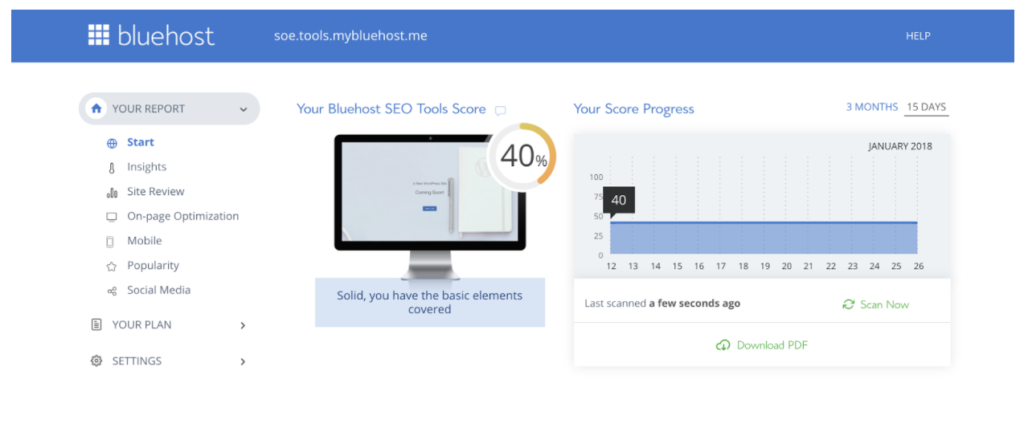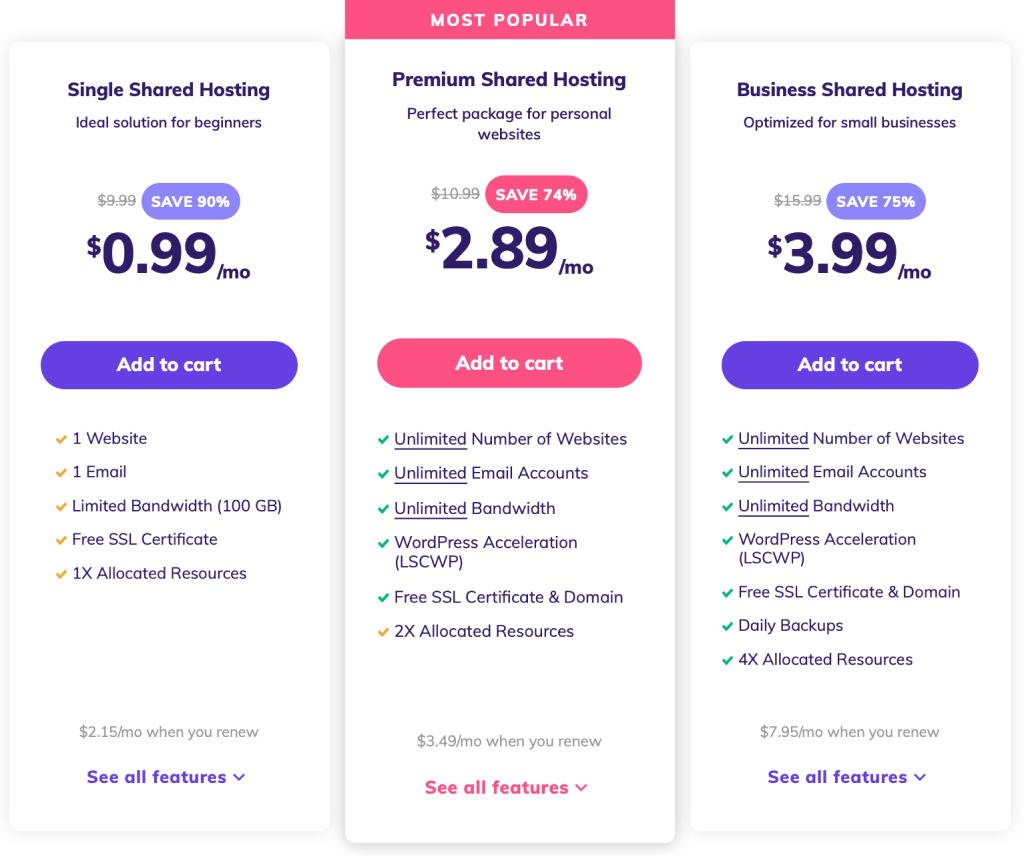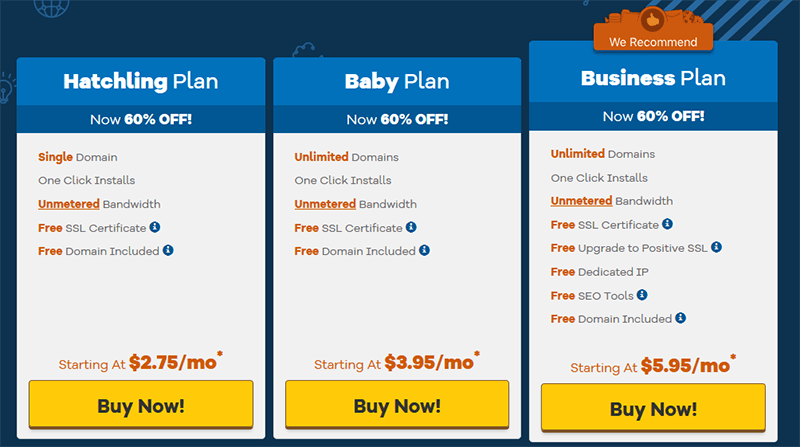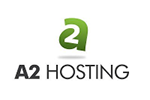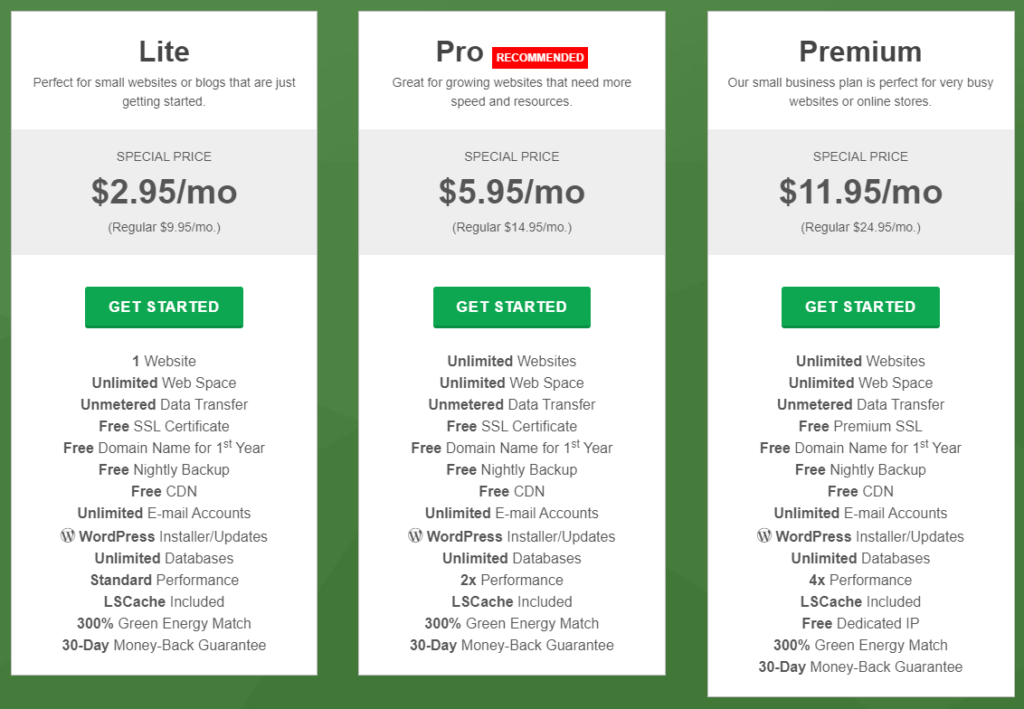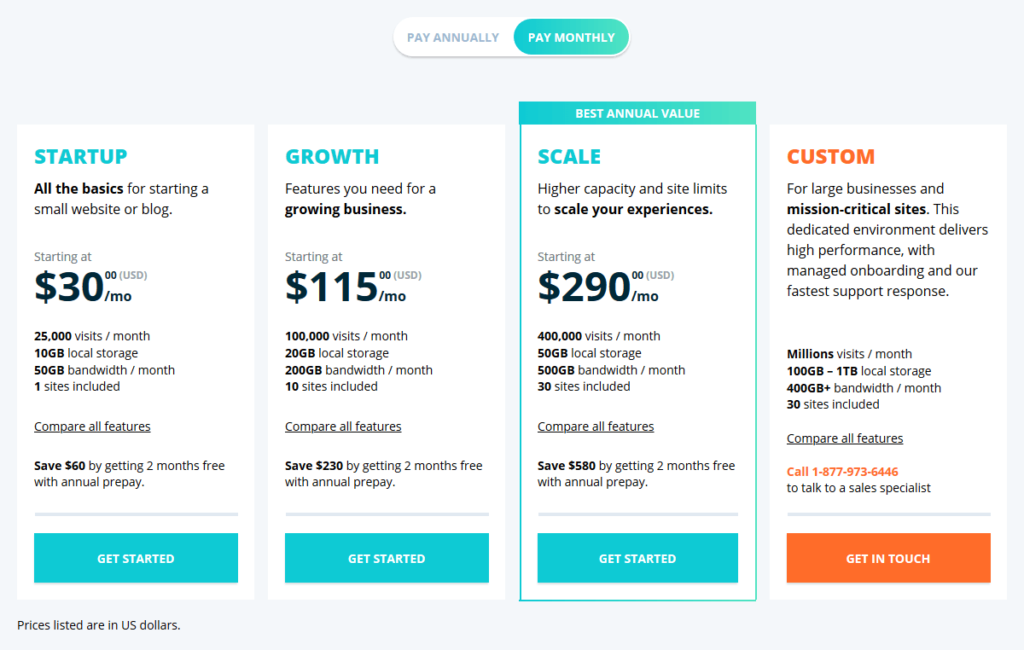Want to jump straight to the answer? The best web hosting providers for most people are definitely Bluehost and DreamHost.
Web hosting services come in all shapes and sizes.
Shared hosting, dedicated hosting, VPS, managed hosting, server cores, different RAM, CDNs, SSL certificates. It’s endless.
We’ve managed hundreds of websites ourselves over our careers. Using our first-hand experience, we waded through all the hosting options and narrowed it down to the best web hosting providers.
Read in-depth reviews of these below — plus, tips for saving money, the best types of hosting for different situations, and our method for picking the right web host.
The Top 10 Best Web Hosting Providers
- Bluehost – Best Web Host for Beginners
- Dreamhost – Most Affordable Month-to-Month Plan
- Hostinger – Best Cheap Hosting Plans
- HostGator – Best for Lean/Minimal Needs
- A2 Hosting – Fast & Reliable Shared Hosting
- GreenGeeks – Best Eco-Friendly Hosting
- WP Engine – Best Managed WordPress Hosting
- Inmotion – Best VPS Hosting
- SiteGround – Best Customer Service
- Nexcess – Best for scaling and growth
#1. Bluehost – Best Web Host for Beginners
- Normally $7.99/month
- Free domain and SSL certificate
- Recommended by WordPress
- 30-day money back guarantee
Bluehost is one of the most popular and best choices for web hosting.
That’s because they offer great shared web hosting solutions at incredibly affordable prices. They’re also tailor-made for folks who are new to website building.
If you get stuck or have a problem, they have 24/7 support by phone or live chat. No hoops to jump through either. They list their support number and live chat options right on their site, you can reach it within two clicks.
They also offer fantastic analytics and SEO tools to help you optimize your site’s performance—while attracting more visitors.
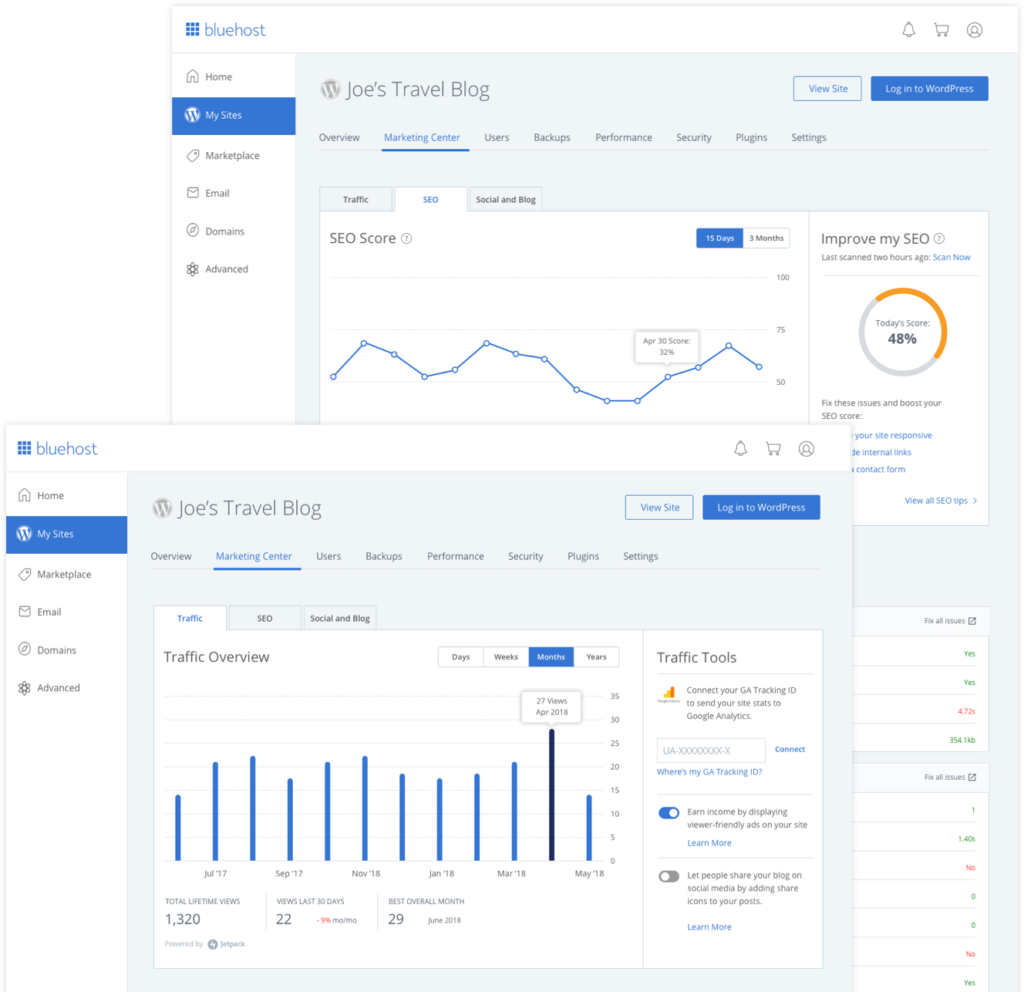
Their SEO tool that scores and tracks how well your website is ranking for specific keywords. This gives you a good idea of how you should optimize your site for the best search rankings.
They also offer hosting that will support whatever direction your business grows.
Let’s say you start with a standard shared hosting plan and want to install WordPress. They have an easy 1-click install to make that happen. Then if your site keeps growing and you want to upgrade to managed WordPress hosting to speed up your site and improve security, they have that too. Or if you want to get more control by upgrading to VPS or dedicated hosting, they have plans for both.
The point is that Bluehost covers everything you could possibly need from a host. That’s what makes them the best for beginner website creators.
If you start with them, you’ll never need to switch to someone else.
#2. Dreamhost – Most Affordable Month-to-Month Hosting Plan
- Unlimited traffic and free migration tool
- Month-to-month pricing at $3.95
- Recommended by WordPress
- 4.6/5 rating from Trustpilot
DreamHost offers a fantastic shared web hosting plan—with very affordable month-to-month prices.
In fact, their month-to-month plans start at $3.95/month. This plan includes 1 website with unlimited traffic, along with a free SSL Certificate—a great deal.
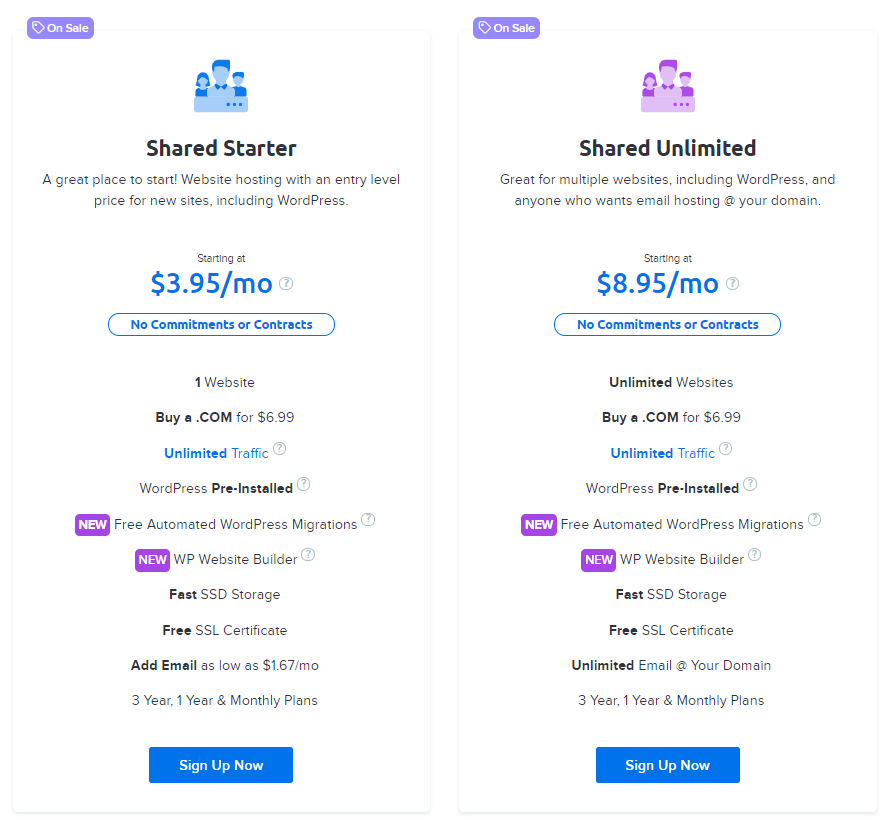
If you’re interested in saving even more money, their one-year and three-year contracts start at $2.49/month, which is still fantastic even though it’s not the lowest on this list (check out Hostinger below for the lowest contract hosting plans).
Along with great prices, DreamHost also stands out for the way they manage their web hosts. They don’t use the standard cPanel that most hosts use. Instead, DreamHost offers a completely custom control panel to manage your website. This is great for developers who want more control over their websites.
There is a catch: It makes things much more difficult to migrate off DreamHost. However, migrating to DreamHost is easier than ever though.
Their free migration plugin lets you migrate in a few steps. You’ll also be able to scale your hosting as your site grows.
If you run a nonprofit, I highly recommend DreamHost. They offer one free Unlimited shared hosting plan for 501(c)(3) organizations.
DreamHost is another one of WordPress’s three recommended hosts, and includes some managed WordPress hosting in its basic shared plans. It also offers a managed plan with more bells and whistles called DreamPress. It does have an industry-leading free trial period — a full 97-day money-back guarantee — and transparent pricing that doesn’t increase after your initial contract.
The free trial period is the longest in the business — 97 days. Since DreamHost doesn’t do promo pricing, the price won’t jump after your first contract is up. This is one of the lowest hosting prices out there, it’s a great option for anyone looking to save every dollar.
Customer service is a little less traditional: email support is available 24/7, but live chat is only on during business hours. If you want technical support over the phone, you have to pay an additional $9.95. However, if you spring for either the DreamPress Plus or Pro managed WordPress plans, phone support is included along with other premium features.
#3. Hostinger – Best Cheap Hosting Plans
- Normally $7.99/month
- Month-to-month pricing
- Free domain and SSL certificate
- 30-day money back guarantee
Hostinger is one of the most affordable web hosts out there.
Seriously, their lowest plan is $0.99/month. That’s rock bottom.
All of these rates are promotion so they’ll go up at renewal. But you’re able to lock in these ridiculous prices on a longer subscription.
They offer four years of hosting for $0.99/month if you pay for the four years upfront. That’s an amazing deal.
Even after the promotional pricing ends, the pricing is still super low. The single-site plan only costs $2.15/month, one of the lowest rates in the industry.
The best part? Hostinger doesn’t feel like cheap hosting.
From the marketing to the UI for managing your site, it feels like a premium host.
Hostinger also offers a separate plan just for email hosting. That starts at just $0.99/month too.
The uptime, site speed, and support are all pretty good too. They have a 99.9% uptime guarantee along with 24/7 support whenever you need help. Don’t expect them to be quite as good as other hosts but the value per dollar is unbeatable.
#4. Hostgator – Best for Lean/Minimal Needs
- Normally $6.95/month
- Month-to-month at $10.95
- Free domain and SSL certificate
- 45-day money back guarantee
HostGator is another web host that caters to small businesses.
However, we found that they’re best for any business that’s looking for simple websites. If you don’t have a lot of bells and whistles you need from a web hosting provider, HostGator is a top option.
I’m talking about websites or portfolios where you just need a visitor’s contact info. Or maybe you just need an about page. Or a landing page to collect leads.
HostGator offers an extensive list of how-to guides for technical support. If you don’t find the answers you need, you can turn to phone, live chat, and email support.
Unlike some hosts, HostGator does include support in all its plans. If you want a hosting plan that’s cheap and includes support, this is the host for you.
If you want to get your hands dirty, there is a bit of a learning curve to take advantage of their advanced options.
HostGator does offer Windows hosting in addition to Linux, as well as a variety of options to upgrade, including cloud hosting, VPS hosting, managed WordPress, and a dedicated server. Shared hosting plans start at $2.75/month.
HostGator tends to rank highly on tech publications like PCMag. If you’re interested in trying HostGator, I recommend taking full advantage of the 45-day money-back guarantee and testing out their support thoroughly before committing. Overall, this is a great web host for simple deployment and uses like a company website that doesn’t necessarily see a ton of traffic each month. However, with VPS options, it’ll allow you to scale if you need.
#5. A2 Hosting – Fast & Reliable Shared Hosting
- Normally $8.99/month
- Month-to-month pricing at $9.99
- Free domain and SSL certificate
- 30-day money back guarantee
A2 Hosting stands out for their great speeds and low prices.
At every hosting tier (shared, VPS, dedicated), A2 Hosting beats other hosts on speed. If you’re coming from another shared web host, you’re likely going to see an improvement in loading speed once you migrate to A2.
With their Turbo Boost and Turbo Max plans, you’ll get access to their Turbo Servers. They boast that it’s 20x faster than their other servers and includes:
- 40% faster AMD EPYC CPU performance
- 2x faster to first byte
- Manage 9x more traffic
- 3x faster read/write speeds with NVMe drives
A2 Hosting also has a 99.9% uptime commitment on all plans so you know you’ll have a reliable host that won’t be down often.
They offer free site migration with each plan too. If you’ve set your site up on a bad host and want to migrate, this is a fantastic deal. It’ll save your dozens of hours trying to get your site rebuilt. The A2 Hosting team takes care of it for you.
Like many of the other web hosts, there are 1-click installs for all the popular CMS tools like WordPress, Magento, and Drupal.
Note: Their startup plan includes only one website.
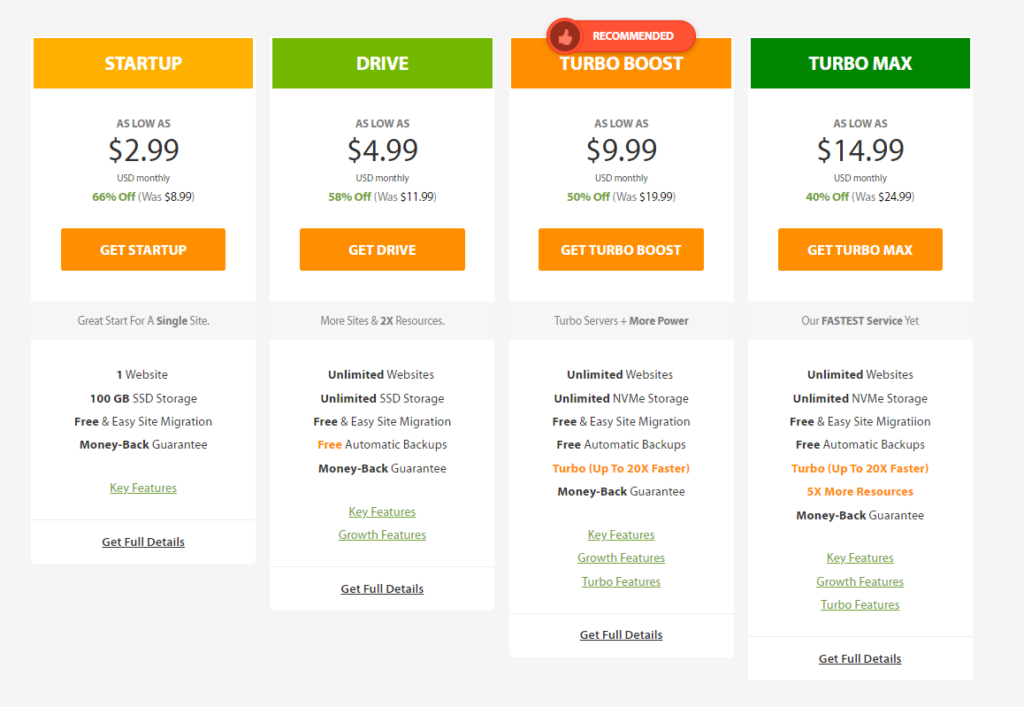
If you plan on hosting multiple websites, you’ll need to get the Drive plan which is an extra $2/month after the promotional period ends.
One trick to save money with A2 Hosting: the promotional prices end on renewal. To lock in the 63% discount for as long as possible, go for the tri-annual billing which will bill for three years at once. You’ll get 2 years of hosting for free.
#6. GreenGeeks – Best Eco-Friendly Hosting
- Normally $9.95/month
- Free Domain Name
- Free Wildcard SSL
- Unlimited Web Space
GreenGeeks is the eco-friendly alternative to other web hosting providers.
“Wait, what?”
That’s right. For more than a decade, they’ve used renewable energy to power their web hosting services.
Aside from being good to the planet, their web hosting services are top notch. They offer fast speeds, solid uptime, and great solutions for:
- WordPress Hosting
- WooCommerce Hosting
- Reseller Web Hosting
- Virtual Private Servers
- Shared Hosting
Bottom line: They’re a fantastic option for eco-conscious businesses and websites.
Here’s a look at their prices for shared hosting.
If you plan to use WordPress then they will make it easy for you to get set up in a snap. They provide an automatic 1-Click WordPress Installer and auto-updates to keep your WordPress site up to date.
They also provide daily backups and advanced security features in order to help you keep your data safe and secure.
GreenGeeks also stays up to date with the latest technology like PHP7, SSD, CDN, and more. This helps make sure your website always stays fast and secure.
They also offer 24/7 support available by phone, chat, or via their ticket system. They are typically very quick to respond and can assist with a wide range of issues.
I’m a big fan of GreenGeeks for their great service and dedication to helping the planet with their environmentally-friendly web hosting plans. If you’re looking for a “green” hosting company, GreenGeeks is just what you need.
#7. WP Engine – Best Managed WordPress Hosting
- Normally $30/month
- Month-to-month pricing
- Free domain and SSL certificate
- 30-day money back guarantee
WP Engine is one of the best (if not the best) WordPress hosts out there. Full stop.
They provide a truly excellent product, that’s highly optimized for WordPress websites. If you want all the storage and speed you can get for your WP blog or online store, this is the host for you.
It does come at a price though. A fully managed WordPress host is noticeably more expensive than shared hosting providers.
WP Engine’s lowest-priced plan is $30/month, and that’s only for one 10GB site with max 25,000 visitors/month.
But when you factor in what WP Engine does for that price, it’s an incredibly appealing option for WordPress site owners. As a managed WordPress host, WP Engine only provides service to WordPress users, which means its entire infrastructure can be optimized for WordPress. Your site will be wicked fast, there’s virtually no downtime, and lots of maintenance tasks get taken care of automatically.
Bottom line: If you want a blazing fast site where everything is taken care of automatically, you’ll want WP Engine.
Customer support is also laser-focused on WordPress, which makes for highly competent knowledgeable support staff available through tracked tickets and on live chat 24/7.
Just be mindful of the price. You’ll be paying more in order to get a lot more. With that said, WP Engine is the ultimate choice for any business running on WordPress. If you don’t want to waste time managing the hosting component of your website, then these are the guys to turn to.
#8. InMotion Hosting – Best VPS Hosting
- Normally $7.99/month
- Free domain and SSL certificate
- Free and unlimited email
- 90-day money back guarantee
InMotion offers truly excellent technology, a wide assortment of plans, and a legion of longtime customers.
InMotion also gives you a massive self-help knowledge base. So if there’s something wrong, there’s probably a guide out there to help you.
The customer support is also among the best. Don’t believe it? Try for yourself. InMotion’s 90-day free trial period for shared hosting is one of the longest around and gives you plenty of time to test out InMotion’s support team.
InMotion’s plans are really straightforward and almost identical. As you upgrade, you’ll get faster servers and extra databases, websites, and subdomains. It’s a straightforward approach we like, especially for small businesses and websites that aren’t overly complex. No pushy upsells or confusing tiers to worry about.
Even the entry-level plans have excellent customer support. It’s 24/7 via 5 communication channels: phone, chat, email, tutorials, and Q&A, which were actively answered.
I also appreciate that none of this support is hidden or hard to find. The phone number is broadcast at the top of the page and the chat support login is easy to find in your admin panel.
There’s nothing more annoying than 24/7 support that requires you first unearth the contact methods on your own. It’s a waste of time and tells me exactly what I need to know about the host.
I also appreciate that the support is available at your level — whether you’re just starting and need someone to walk you through the ultimate basics with a friendly and supportive demeanor, or you want someone who can talk specs and technical nuances like a pro, the InMotion support has you covered.
InMotion also has some of the best VPS hosting options. They even have two types of VPS hosting so you can get the exact amount of support or flexibility that you want:
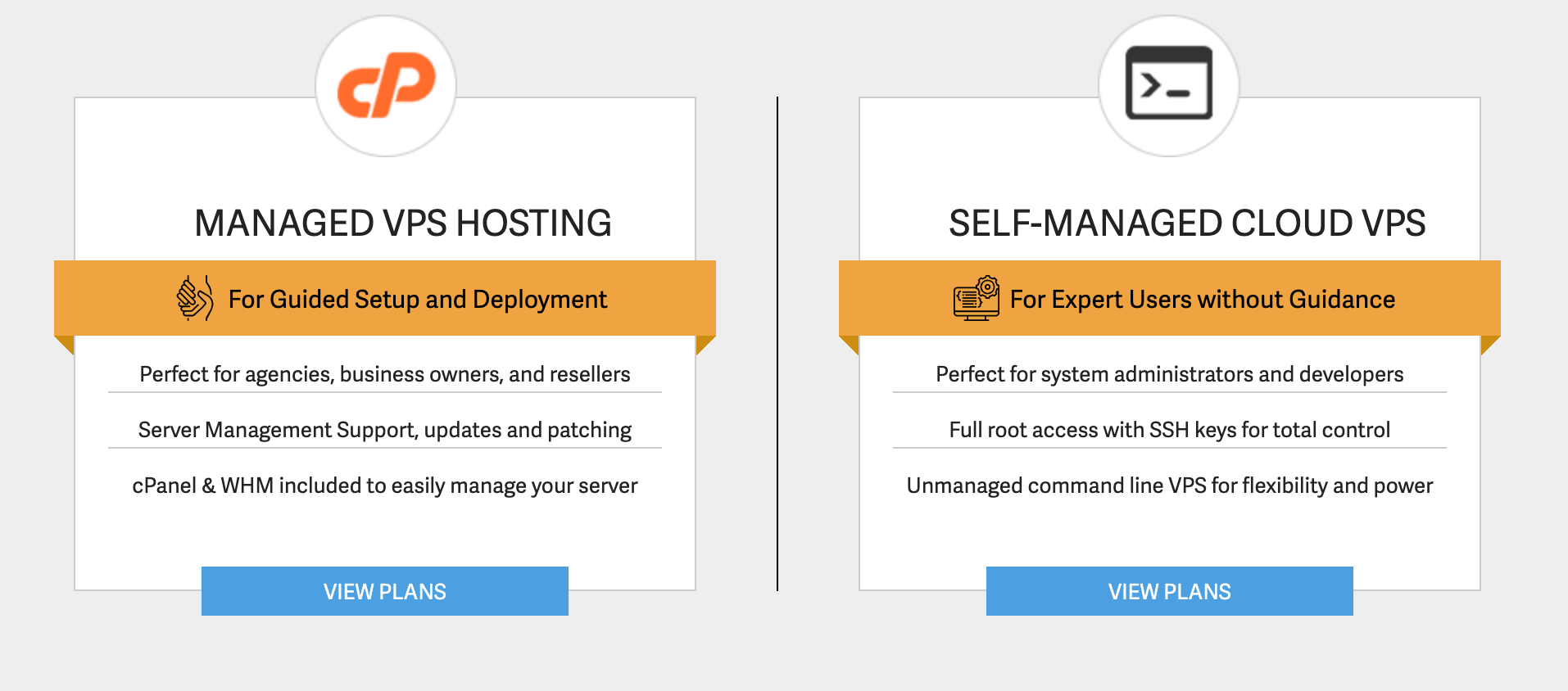
InMotion regularly runs promo pricing, with deals that start as low as $5/month. Normal pricing for shared hosting bumps up to $8–$9/month after the initial contract is up.
In addition to shared hosting, InMotion offers upgrades to managed WordPress hosting, VPS hosting, and dedicated servers.
#9. SiteGround – Best Customer Service
- Normally $14.99/month
- Free SSL, email, CDN, & backups
- Recommended by WordPress
- 30-day money-back guarantee
SiteGround comes with two things a lot of web hosts don’t: a rabid fan base and glowing reviews.
In fact, 97.7% of their clients are very satisfied with their service according to SiteGround’s annual satisfaction survey.
Along with DreamHost and Bluehost, SiteGround is one of WordPress’s three recommended web hosts. That’s because WordPress hosting is built into all of their shared hosting plans. That means you’ll get automatic updates, streamlined security, and expert technical support.
SiteGround’s infrastructure is fully optimized for WordPress too. They leverage Google Cloud with an ultra-fast network and SSD persistent storage. Users have access to their suite of WordPress features such as their WP Starter plugin that helps you easily build a website.
Their shared web hosting is probably their best offering. SiteGround’s servers are ultra-fast and extra secure, and they are constantly deploying new updates to keep them that way. They have a host of different security measures including an in-house built server monitoring system that checks servers every half a second. Their 24/7 security team is always keeping a hawk-like eye out for software vulnerabilities.
Their highest tier plan (GoGeek) is suped up with tools developers will find especially useful, including a staging server and Git repo creation. Lots of small business and personal websites will probably find this overkill, but if your needs are more complex than the basics, SiteGround has a lot to love.
There is one slight downside. Once you blow through SiteGround’s introductory pricing, your plan’s price increases a bit.
For example, its lowest tier of shared hosting jumps from $6.99/month to $14.99 and its highest tier jumps from $14.99/month to $39.99. That doesn’t feel great. Though it’s worth mentioning that they offer premium features such as SSL, daily backups, and great loading speeds to justify the price.
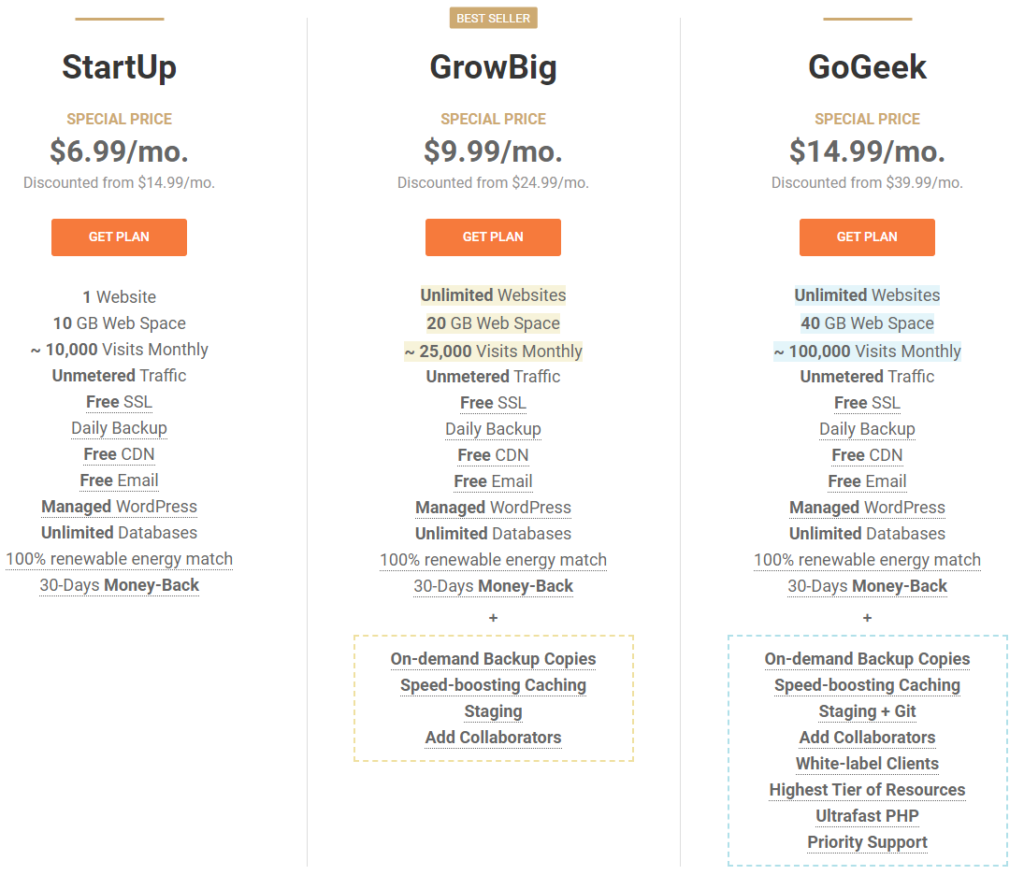
In fact, it was the reason for most of the one-star reviews on TrustPilot. Watch for this when you’re comparing pricing and remember that your hosting plan will last a lot longer than the promotional period.
SiteGround’s trial period is 30 days—which is typical in the hosting industry. There are a few other offerings on this list that offer a longer trial period. This isn’t a major problem though. You’ll be able to easily evaluate any host within a month.
SiteGround also offers cloud hosting. In fact, SiteGround is one of our top picks for cloud hosting due to its power and features such as the auto-scaling tool. This allows you to meet unexpected traffic sites by scaling more resources for your website without you needing to do it yourself.
If you think there’s a chance you’ll need to upgrade to some serious hosting power once you generate lots of traffic, SiteGround is a great option that will make upgrades easy later.
Their customer support is available 24/7 across all channels — phone, chat, and email — and its knowledge base is rich and well-organized.
They also have the most transparent uptime: it has a 99.9% annual uptime guarantee (or you get a month of hosting free) and posts both its annual average and the previous month’s uptime right on its site.
SiteGround’s annual uptime compared to last month’s.
SiteGround is an amazing option for businesses with room to grow. There’s plenty of upgrades to support you along the way.
#10. Nexcess – Best for scaling and growth
- Managed web hosting for 9 CMS
- Great for ecommerce sites
- 24/7 customer service
- Choose from 6 different plans
Nexcess is a web hosting solution from Liquid Web — a provider we’ve featured on our lists for best dedicated web hosting, best VPS hosting, and best WordPress hosting.
So it’s no real shock that Nexcess makes our list for best web hosts. This is especially true when you consider their wide menu of managed ecommerce hosting. In fact, they offer ecommerce hosting for:
- Magento
- Woocommerce
- WordPress
- Drupal
- BigCommerce
- Sylius
- ExpressionEngine
- Craft CMS
- Orocrm
There are a number of areas that make them stand out amongst the rest too. For example, their Nexcess Cloud Accelerator—a feature that adds a layer on the cloud stack that increases the speed of your websites loading time. That’s a huge boon because speed is everything when it comes to keeping your customers on your website and browsing.
They also offer a massive suite of plans for each of their web hosts. Here are the ones from just WordPress for example:

This makes Nexcess perfect for any growing business looking to scale. No matter where you are with your business, there’s likely a plan for you with Nexcess.
On top of that, they have a dedicated support team available 24/7 to help you address any technical issues as they occur. Very important when it comes to web hosting.
If you’re running an ecommerce website or if you have a startup that you know will grow quickly, Nexcess should definitely be in consideration.
Prices vary depending on which CMS platform you want to use. But their WordPress plans start at $15.84/month.
Which Type of Hosting Is Right for You?
Now, let’s look at the best hosting for different situations (see definitions of hosting types at the bottom of this post).
The Best Shared Web Hosting
For most, shared web hosting is the way to go.
Shared web hosting means that your website is on the same server as other websites. Most sites are small enough that they don’t need an entire server to themselves so web hosts bundle a bunch of sites together and put them all on the same server.
This is how web hosts get the price of hosting down.
In most cases, it’s a great deal.
There are downsides. If one site on the server gets taken down, yours could get taken down too. If several sites are on the same server and one of those sites gets a huge traffic spike that takes the server down, all the sites go down. So it’s possible for your site to go down at no fault of your own.
In practice, this rarely happens. Especially for smaller sites that can handle a little downtime every once in awhile, having shared hosting is a great trade-off in order to get the hosting bill lowered.
Think of shared hosting as the ideal “entry-level” package for your site.
So which hosting companies are the best for shared hosting?
These are the 5 best shared hosting companies:
The Best WordPress Hosting
I’ve managed multiple sites with hundreds of thousands or millions of visitors per month. My favorite (and one of the easiest) ways to draw in traffic is through a good blog.
When it comes to blogs, WordPress is by far the best option for running the blog.
These days, I always get managed WordPress hosting for my high traffic blogs. Managed WordPress hosting is a specialized hosting package that’s optimized for WordPress.
There’s a few major advantages to getting specialized WordPress hosting:
- Everything is streamlined around WordPress
- Security is extra tight
- WordPress updates and server maintenance happen automatically
- Backups happen automatically
- The support team has advanced knowledge of WordPress
- The site can handle much higher traffic volume since everything is built around WordPress
There is one major downside though: the cost.
Managed WordPress hosting tends to be more expensive. If you’re building a site with the goal to generate tons of traffic (50,000+ visitors/month), it’s absolutely worth it.
I go this route even if I don’t have the traffic volume yet. As long as I’ve set a goal to build that traffic over time, I’ll choose a managed WordPress host from the beginning.
If you’re a smaller site and intend to keep it that way, skip managed WordPress hosting. The premium features won’t provide enough value to justify the extra cost. Just about every host out there allows you to install WordPress easily and quickly.
Our 3 favorite WordPress hosts:
The Best Small Business Hosting
Small business owners have a lot to juggle. From marketing to employees, their resources are often stretched thin—and limited.
The best web hosts for small business are super reliable, have world-class support when the odd issue does come up, and have a reasonable price. This minimizes the extra tasks for the owner while also keeping expenses low. And when things do go wrong, a solid support team makes the fix as painless as possible.
You’re looking for that sweet spot between price, reliability, and an amazing support team.
These are the 2 best small business web hosts that excel at all three:
The Best Cheap Hosting
There are plenty of ways to save on web hosting. And since they recur every month, getting them as low as possible does add up over time.
I want to give you a quick warning though.
Cheap definitely isn’t always great when it comes to web hosts. There is a point where reducing the costs any further seriously impacts the quality of your hosting. Your site will be down on a regular basis, you’ll never be able to get a competent support rep to help you, and every task you try to complete will have a horrendous user experience.
We’ve found the best cheap web hosts. While their service isn’t quite as good as the others that we recommend, it’s good enough if you’re trying to get the cost down. Just be careful about shopping around for even cheaper deals, it’s usually too good to be true.
We recommend these 2 hosts if you’re trying to get your hosting costs as low as possible:
They’re also good for side projects or ideas that you’re playing around with. Then if it becomes a real project or business, you can always switch to one of the better hosts later.
The Best Cloud Hosting
If you’re building a larger site or want to guarantee your uptime, you’ll want to look for cloud hosting.
Cloud hosting is a bit different than shared hosting.
Instead of a bunch of different sites using the same server, your site will get spread across multiple servers. This has a few major advantages:
- Other sites can’t take your site down. If they get a spike, your server can simply start using other servers.
- You can quickly scale your site bandwidth up and down. Since you’re already using multiple servers, it’s really easy to add more or take some away.
- Since there’s redundancy across multiple servers, server uptime gets a lot better.
All these benefits do come with a higher cost. No matter which cloud host you choose, it will be noticeably more expensive than a shared hosting package.
I use the 50,000 visitors rule. If my site has above 50,000 visitors a month or will in the foreseeable future, I move it to cloud hosting.
Consider cloud hosting if you’re planning on building a large site or have a business that can’t afford any downtime whatsoever.
These are the 3 best cloud hosting companies:
How To Find The Best Host For You
Before diving into all the criteria on how to evaluate web hosts, I have some simple rules for you on picking your web host:
1. If you plan on building a high traffic WordPress blog, get WP Engine. The extra cost is well worth it. This is also a good option for folks that want to pay a little extra so they never have to worry about anything related to their hosting.
2. For all other sites, get a web host that’s fast, has great uptime, and amazing support. Bluehost, Siteground and InMotion are your best bets here.
3. If you really want to get the cost down, do with Hostinger or Hostgator. Both are decent at low prices. I wouldn’t consider hosts that are any cheaper than this though.
By following these rules, you’ll be happy with the host that you get and won’t have to switch any time soon.
So how do we evaluate web hosts? What actually matters?
Let’s go through all the key items.
Site Uptime
If people can’t access your site, why have it at all?
First and foremost, you want a web host with great uptime. This means you’re site is always available and never goes down.
To try to avoid the “just trust us” promise of near-perfect uptime, most hosts provide some sort of guarantee of at least 99.9 percent uptime. However, that guarantee isn’t much of a guarantee. It just means your bill can be discounted in the event of any unplanned downtime. There’s a lot of fine print on these guarantees, too, including not accepting self-reported or third-party uptime data, and not providing refunds for downtime that was out of the host’s control (for example, a hurricane).
Site Speed
Site speed impacts everything related to your site. Want search rankings? Get a fast site. Want conversions on your site? Make it fast. Want happy users? Speed it up.
Every part of your business is impacted by the speed of your site.
When looking at different web hosts, make sure you’re choosing a host that can serve every page lickity split.
There is some nuance with site speed.
In the early days, you need a host that’s fast “enough.” It doesn’t have to be blistering fast but it needs to be fast.
Think of Amazon. Back in the day when Amazon just sold books, their site needed to be fast but it didn’t need to be instantaneous.
Now that many people use it for all their shopping, Amazon’s site can’t be fast enough.
The bigger you get, the faster you’ll want to be. If you’re planning on building a high-traffic site, you’ll want a host that can maintain crazy-fast speeds on large sites.
Customer Support
When running your own site, web host customer support is the single most important thing a web host can offer.
Digging through use reviews doesn’t always give you a conclusive answer on the quality of support at a particular web host.
There can be a discrepancy between reviews and quality. Take, for example, HostGator. Technology publications tend to rank its products highly: it earns a score of 4.5 out of 5 on both CNET and PCMag. But it has 1 and a half stars on Trustpilot and only 4 and a half stars on WhoIsHostingThis — and nearly all of negative comments are directed at customer service.
Watch out for glowing reviews on top publications, they don’t always reflect reality.
There is one true test for assessing the customer support quality at any host.
The free trial customer support test.
Pretty much every web host has some sort of money-back guarantee on their shared hosting plans, which means you can set up your website and see what you think of the service with relatively low stakes — just your time and any add-on fees you opt into, like paying for domain registration. We recommend going to town with customer support during that trial period. Get on live chat, open tickets, hop on the phone as much as possible to see if you like what you’re being served up.
Most web hosts offer some sort of free trial period. I recommend using this time to really dig into your host’s customer support — its knowledge center and especially support staff across all channels. That’ll tell you the real story.
Traffic Volume
The amount of traffic that you get has a huge impact on the hosting that you need.
For a site that gets 300 visitors every month, pretty much any standard hosting package will be good enough. As long as your web host has strong customer support, you’re good to go.
As you get bigger, all sorts of small details start to matter a lot more.
Is the PHP on your server being updated regularly? Do you have a CDN for your content?
Is your site being backed up daily and can you restore it within 15 minutes if something goes wrong?
Do you have an SSL certificate? Can your server handle a giant traffic spike during a marketing promotion?
Whenever I have a larger site, I look for premium hosting that takes care of all this for me. And if I’m planning on building a large site, I look for a host that can easily scale to millions of visitors per month. I’m happy to pay a premium price in order to guarantee easy upgrades in the future.
Don’t skimp if you’re going big.
And if you plan to stay under 50,000 visitors/month, get a standard shared hosting package. There’s no reason to worry about the advanced stuff.
Price
While you don’t want to overpay on hosting, you definitely don’t want to underpay either.
Avoid choosing a host exclusively on price.
Most basic web hosting plans are in the $10-$20/month range. Yes, there are cheaper options. Some of them are promotional offers that go away at renewals. Others are hosting plans with terrible support and uptime.
My rule is if the price sounds too good to be true, it probably is.
I also don’t worry about chasing promotional offers to save a few dollars. For every site I’ve ever managed, we used our host for years on end without ever switching once we had a host we were happy with. Promotional offers come and go pretty quickly.
Migration Features
The ability to easily and quickly migrate an existing site will save you weeks of time.
Even a basic WordPress site can be a real hassle to migrate. First you have to set up a new WordPress install on your new host. Then you need to export the database of content from your old site and import it into your new one. Finally you have to re-configure everything in WordPress like the theme, plugins, and settings.
That’s a real pain and that’s why we put together an entire guide on WordPress migration.
It is possible to skip all this.
Some hosts will offer a 1-click migration for popular site builders like WordPress.
If you’re switching hosts and handling the migration yourself, look for an easy migration feature. This is a great way to make the final decision once you’ve narrowed it down to a few final options.
Managed Hosting
Here’s how a normal host works:
- After you sign up, you get a login.
- The login takes you to cPanel. The cPanel is an app on your server that lets you manage it through a UI without needing to know how to code anything.
- You configure your server however you want.
- There’s a FTP option to upload files manually to your server.
- There are also quick options for installing WordPress and other site software if you want.
- You get full access and can do anything you want. It’s a “choose your own adventure.” Install WordPress, Drupal, Magento, or code your entire site by hand.
Most web hosts work like this.
There are also managed web hosts. These hosts customize the hosting environment and manage a lot more of it for you.
WP Engine is the best example, they’re a managed host for WordPress. Instead of getting a cPanel login that lets me do anything I want, WP Engine gives me a login to their custom interface that’s built to manage WordPress sites specifically.
When a web host is optimized exclusively for WordPress, three key things happen. First: It gets faster than pretty much any shared hosting provider can dream of. Everything can be tailored to making WordPress work its best, whether that’s optimizing website caching or tinkering with the command line tools. The host only needs to know how to support WordPress, as opposed to, say, Joomla and a Node server and some sort of custom-made site and on and on.
Second: Sites get more secure and stable. A managed WordPress host can build a system that predicts, accommodates, and patches all of WordPress’s vulnerabilities. That means fewer malicious attacks and less downtime.
Finally, and perhaps most importantly for small businesses: Admin and site maintenance get a lot easier. And that service is vital because managed WordPress hosting is significantly more expensive than shared web hosting services.
While I give up some flexibility from not having a basic web server like other hosts, a managed host takes care of a lot of ongoing tasks that I’d normally have to handle myself.
If you have a small business site, a normal host is fine. If you’re building a larger site, a managed host will save you a ton of time in the long run and is worth the extra cost.
Definitions: Shared, Virtual Private Servers, Cloud, and Dedicated Hosting
Shared hosting means that you share space with a bunch of other sites on the same server. The advantage is that it’s a lot cheaper. The downside is that other sites can impact the performance of your site. If someone else gets a huge traffic spike, it could impact everybody on that server before the web host throttles their traffic.
Virtual private servers (VPS) also has multiple sites on the same server But these sites have dedicated space that’s managed by software. You get many of the benefits of having a dedicated server (you own IP address, less volatility in uptime, etc) without needing an entire server for just yourself. But the performance isn’t quite as good as having your own server to yourself.
Cloud hosting is similar to VPS but instead of having space on once server, you get space across multiple servers. Like VPS, it’s resilient to traffic spikes from other sites. If a site on your same server takes that server down, your host simply moves your site to another server. That’s why they call it “cloud” hosting.
It’s also extremely scalable for your own site. Adding more resources to your site is a breeze since your host only needs to increase the total server resources that you can consume at any given time. Because of these advantages, it does tend to be more expensive.
Dedicated hosting gives you a server just for you. No one else gets space on that server. You’ll also be in complete control and can configure that server however you want.
Which of these should you get? Here are some simple rules of thumb:
- Small sites should be on shared hosting. Any impact from other sites on the same site will be minor. This is the best option for any site that does 50,000 visitors per month or less.
- When you get over 50,00 visitors/month, move towards cloud hosting and then a dedicated host if you really need it. Don’t worry about a dedicated host until spending thousands of dollars per month on hosting sounds like a rounding error in your annual budget.
Last Tip: Ignore Free Web Hosting
For just about everyone, free hosting is not worth it.
Web hosting is not where you should save money. If you’re worried about the price of hosting, I’d say you need to worry about generating revenue and traffic before trying to save a few extra dollars cutting hosting costs.
A free host is only good for something like an event one-pager or an extremely small, extremely low-traffic site. If you are doing either of those things, you should still skip the free host route and jump straight to a free website builder that’ll let you link your site to a custom domain for free, like UCraft or Google Sites. They’re both very basic limited builders, but they are easier to get up and running than a free web host.
That being said, there are some great free and discount web hosting plans for nonprofits and educators. If that’s you and you want to know more, head over to my best free web hosts review. I go into lots of detail there.
Conclusion
Out of hundreds of web hosting companies I have narrowed it down to my top 10 picks for the best web hosts.
Whether you are searching for the cheapest price or the most robust services, or something in between, you can find the best web hosting for your needs from these top-rated companies.
from Quick Sprout https://ift.tt/2zg41Ib
via IFTTT

